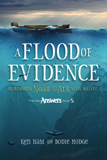
7 Practical Reasons Every Christian Should Be a Biblical Creationist
There are many Christians who think that the issue of how God created the world doesn’t really matter, that this type of intellectual bickering doesn't affect how we live our Christian lives. There may be intellectual arguments that have little effect on our lives, but creation is not one of them. Here are seven wonderfully practical benefits of being a biblical creationist.
Biblical creationists, in particular, can take comfort and joy in these things. And anyone who isn’t or doesn’t think that creation really matters should take the time to seriously consider the seven reasons below.
1. God is always good.
God used the word good seven times in Genesis 1 to describe His creation. The seventh time, He said, “God saw everything that He had made, and indeed it was very good.” If God allowed millions of years of death, disease, and bloodshed to bring the world about, then we had better ask ourselves what God means by “very good.” But if God created the world in six 24-hour days the way He said He did, then we can know that when God said “very good,” He meant a good greater than we can possibly imagine because He is always good. In fact, God is the very definition of good (Psalm 34:8, 107:1)!
2. God always keeps His promises.
In Genesis 6:5–7 God said that He was so grieved by the wickedness of man that He would destroy all men, beasts, creeping things, and birds from the face of the earth. Go read the account yourself. God puts such an emphasis on the Flood being global that it actually sounds quite redundant (Genesis 6–9). Yet many people still deny that a global flood ever happened, just like the Apostle Peter predicted in 2 Peter 3:5–6. Trying to reinterpret the Genesis Flood as a local flood creates a troubling problem because God promised that “never again shall there be a flood to destroy the earth.” There have been thousands of local floods since that time. If God didn’t keep all of His promises, all other promises would be brought into question. But if God meant what He said, then we can put our trust in Him, because God always keeps His promises (Titus 1:2; Hebrews 10:23)!
3. Strong faith is rooted in God’s Word.
If we place too much faith in man’s word, then we will be “tossed about by every wind of doctrine” (Ephesians 4:14). Every scientific report that doesn’t seem to fit with the Bible will make us question whether God meant what He said in His Word. But when we realize that “the entirety of Your word is truth” (Psalm 119:160), then man’s godless opinions will be put in their place. Even unbiblical ideas like millions of years are “like the chaff that the wind drives away” (Psalm 1:4). Our faith will grow like a strong oak tree as it’s rooted in God’s Word.
Not only that, but when trials come and bad things happen, we will have a greater faith to trust that God is good in the midst of those trials. God shouldn't be blamed for the bad things that happen in this world. He created the world very good, but man’s sin brought death, disease, bloodshed, and sorrow into it (Romans 5:12). Faith rooted in God’s Word allows us to look trials in the face and trust our very good God that He will complete His good and perfect work (Romans 11:33–36).
4. Worship is based on creation.
When we value God’s written Word as our highest authority, we also have a high view of God. Anything we can do to have a higher view of God will breathe life into our worship. We are created to worship God, and in a sense our worship is based on the reality that He created us. In fact, in Heaven one of the praises directed at God is for His creation of all things (Revelation 4:11). When we study creation, we can ignite our worship. For example, gazing at the vast expanse of stars that God created on Day 4 reminds us how high God is and how low we are. Yet God still chose to create us uniquely in His image and, despite our rebellion, chose to redeem us.
5. Jesus is trustworthy.
Whenever Jesus talks about history in the Scriptures, it’s clear that He knew it was real history. In Matthew 19:4–5 Jesus said that God made Adam and Eve “from the beginning.” If God used evolution, then man came along billions of years after the beginning. Was Jesus mistaken? Was He lying? When we take Genesis as literal history, we don’t have these major theological problems. Jesus’ words are trustworthy. Jesus is truth.
God, the Creator, made man unique and in God’s image. If God used sickness and death to drive the evolution of life, why would Christ heal the sick and raise the dead when He came to earth? If evolution is God’s tool for biological progress, then sickness and death are in some sense good things. But Jesus didn’t seem to have that mindset. Sickness and death grieved Him because they weren’t part of the original creation (John 11:33). Jesus lived by a consistent worldview. He is always trustworthy.
6. Jesus conquered death.
Jesus lived a sinless life, died physically, and rose from the dead physically. But if sin only brought spiritual death and not physical death, then why did Christ have to die physically? Christ’s physical death and resurrection demands a young earth where a literal Adam and Eve sinned against God and brought death into the world. Christ’s physical resurrection also shows us that our future resurrection will be physical.
7. Our hope is sure.
The Apostle Paul says in Romans 8 that “the whole creation groans and labors with birth pangs.” If God called millions of years of death, disease, and bloodshed “very good,” then why would the new heavens and new earth be free of death, disease, and bloodshed? But if we take Genesis plainly, we can also have a sure hope that when Christ returns He will “wipe away every tear” and create a new heaven and new earth (Revelation 21:1–4) that are indeed very good!
Recommended Resources

Answers in Genesis is an apologetics ministry, dedicated to helping Christians defend their faith and proclaim the good news of Jesus Christ.
- Customer Service 800.778.3390
- Available Monday–Friday | 9 AM–5 PM ET
- © 2026 Answers in Genesis






